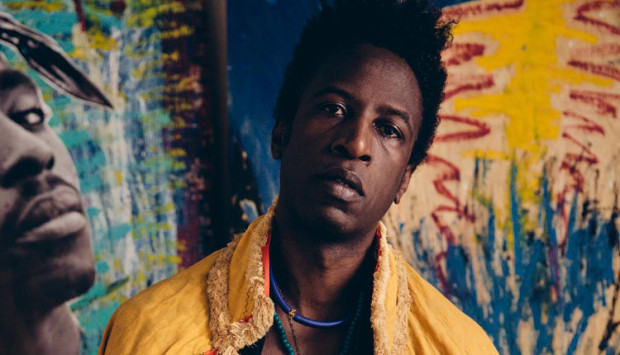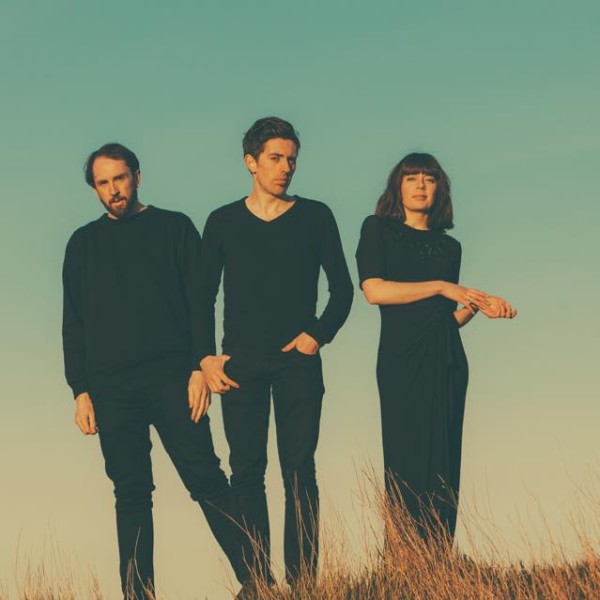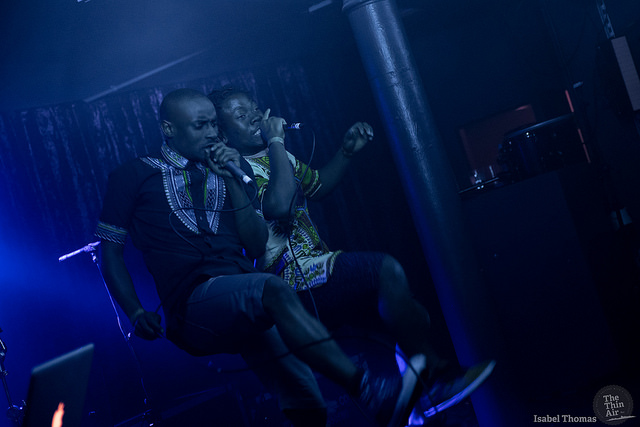Saul Williams as an artistic figure is a force of unshakeable power. His ability over the course of his career to tackle social, personal and political issues with verve and master craftsmanship has been insurmountable and defiant of any possible pigeonholing. From poetry to music, from acting to journalism, William’s medium defying career has turned him into an artistic totem in the sphere of social commentary. I spoke to him about his recently published poetic commentary on the state of America, US(a.) – a work that began when he returned to the States having lived in Paris for several years – and his upcoming album/graphic novel Martyr Loser King. By virtue of what it is, speaking about his works becomes inseparable from discussions on the origins of the content and on the inescapable realities of culture and society that drive him to produce the art that he does. In a relaxed, if brief, conversation it felt like small windows were gradually being opened into the psyche of the man that spoke to me down the line.
Saul Williams headlines Lingo Spoken Word Festival in Dublin on Sunday, October 18. Go here for more info and to buy tickets.
Hi Saul. So, you’re in the middle of fairly extensive tour, having just finished up in America and about to start travelling across Europe. How are you doing?
I’m pretty jetlagged! I arrived in Paris this morning and have been pretty on the go!
How is it to be back in Paris?
Oh it’s super cool. It’s nice to walk around a bit and hit all the old spots. It feels really good.
How has the tour been going? How has the reception been to the new material from US(a.) and Martyr Loser King?
It’s been really great. The book that I just released – US(a.) – was in many ways a challenge to myself just because of the amount of time I had to write it. It was a commissioned piece so I was given a year to write it. It meant I approached the poetry differently. There’s a lot of much shorter poems than I normally share. I mean, I write a lot of short poems but I rarely share them. There’s a bit of humour involved too this time so I had a lot of fun with it. It’s been a good time so I’m happy with the response.
It’s interesting that you’d remark on the humorous side. You seem to approach each individual volume of work with a very particular mood or sentiment. For example, when you released Volcanic Sunlight in 2011 you said that it was your first release that hadn’t come from a place of anger. What stance or sentiment do you feel defines US(a.)?
Well, anger, disappointment and disillusionment are certainly all there! And that probably defines it to tell you the truth. It’s like when you let the cap off the anger and let it steam forward. The flip side of that though was the emphasis that I put memories and dreams. I was reacquainting myself with the city I grew up in and was also being forcibly be reacquainted with the reality I grew up in with regard to police brutality and all the nonsense that has been prevalent on the news in the States in the past year or so.
You’ve mentioned before how social media has played a huge role in emphasising these social issues in where you’re from, and how they’ve become much more prevalent issues in the public eye as a result of that…
Yeah, I mean, social media has played some huge roles, not just there. One of the first things we can look at is the Arab Spring. I think that’s pretty much the point where it became undeniable. Or WikiLeaks… We’re really clear on the fact that this new media and these new tools for accessing people and ideas can have their effects on society. And yeah, sometimes they do bring conversations to the table in a much more substantial way that would have happened previously.
From reading about your upcoming Martyr Loser King release and hearing the first song ‘Burundi’ from it, there is an emphasis on hacking and the various ways that it can be defined and interpreted. Do you think the power of social media then has a negative end? Does it have the power to brainwash, to hypnotise, to hack into people as it were? Where do you stand on the idea of surveillance in that regard?
I’m going to treat that as two questions. For the first part, we said the same thing about media as a whole before “social media” came into play. So yes, there’s always the possibility that people will want to take shortcuts to thinking and would rather cosine what an article says than pick through a matter and delineate what works for them or not. Media is always going to play that role and social media certainly plays into that idea. In terms of surveillance then, it’s interesting to weigh surveillance versus the idea of transparency. I think the two kind of balance each other out. On the one hand we fight for privacy rights, but on the other hand surveillance seems inevitable. Cameras are everywhere, but we want our cameras everywhere. We want our phones everywhere, we want to be able to reach people from everywhere. It’s hard to imagine that we could connect to those systems without those systems being able to monitor where we are, what we’re doing and what have you. It would be foolish to assume otherwise. It kind of comes with the territory.
And that’s something you think you’ve tackled in Martyr Loser King?
Certainly. It’s tackled to a degree because the main character, Martyr Loser King, is wanted for a long time and they never find him because they believe that his signal, which is coming from Burundi, must be a thrown signal. They just can’t imagine that guy, a hacker like that, could be coming from Burundi. Their own arrogance is in the way of what their surveillance is telling them, but he does become a victim of that surveillance all the same.
Is it true that this is the first venture where the music has been entirely produced by you?
Yeah, well, I’ve probably always had 85-95% musical control for the albums. But I’ve always had help to some degree. The difference this time is just that I’m playing the instruments too.
Has that increased control influenced the process as a writer and lyricist?
I don’t know if that has influenced the process. I just think my own personal evolution as a writer and musician is constant. The one thing I’m trying to do through music is commune and there’s quite a difference between communication and communion. Communication usually implies sound or text, whereas communion doesn’t need to involve words. I find myself leaning less heavily on words in this case. I guess there’s some irony in that… But I don’t know that I would say that doing all the music influenced that, I think it’s just a natural progression. There are sounds sometimes that get the idea across better than words themselves.
I guess then it’s just the case of finding a way of combining those two to create a unique impact or message on the listener. . .
Exactly.
Constant development as a writer and change as a person is obviously an inevitable result of simply being a person and being an artist and writer. Being someone who has over the years been so forthright with your words, expressing them with such purity, honesty and often aggression, do you ever find yourself looking back on things you have written or believed with a sense of, say, “regret”? For want of a better word.
You know, I have gone through that. More so like five or ten years ago I would have looked back on older work with a feeling of “uuuh, I don’t know…”. But I’ve actually come back to a lot of those works since then and as of right now I would actually report that I’m pretty comfortable with past work! But that has a lot to do with carefully screening and choosing the things that get through in the poems in the first place. I’ve often looked at many of poems and the general writing of poems as a sort of time capsule. I’m really trying to capture a time or an idea like in a journal or a photo album. What may be one thing to the audience may be, in fact, a series of trigger words that make me remember certain instances: “Oooh that’s from when I was in that cave in Belize!” or “That’s from when I was on that train!”. I have little keys that enable me to remember some of the places and things that I’ve experienced. So going back to old poems is often more of a charge than a let-down. So no, I guess I can’t say that there’s things that I’ve said that really make me feel like “Oooh no, I really don’t believe that anymore”. In fact, more recently, I’ve looked back on some poems and found that, hey, maybe I was stating some ideas clearer than I imagined.
I guess when you look back like that it’s important to realise that they are thoughts that were felt very sincerely at a time. If they were felt with enough conviction and passion a time, it’s hard to pass them off as meaningless because they were truly believed.
Precisely.
You’ve talked recently about how a lot of music and art lately seems honed in on ideas of escapism, that it has inaccurate focus with no real benefit. That the “bigger picture” is being blurred for people. In ‘Unanimous Goldmine’ you say we “Paint a dreamworld/solid enough/to hold us”. Who are some artists that are out there that our defying that in your eyes? Who is doing it right and approaching art and music in the way it should be approached?
Oh there’s so many! Well, from the UK, I’m a really big fan of King Krule. But really there’s hundreds of groups and musicians that are getting right. It’s not really about that though. The problem I spoke about was more so to do the idea of what is being projected by pop media. You know, the sort of celebration that seems to happen around certain ideas or lack of ideas if you will. It kind of relates to the other question you were asking about the role of media. The critique that I gave that you’re referencing had a lot to do with American culture and of the sort of “dumb-down” that I’ve seen in the populace regard. We have these ideas of the “superhero”, ideas of what makes a great movie or a fun TV show… you know this is the country where this week the Kardashians are on the covers of magazines being called “The First Family of America”. It’s that sort of thing… I’m really not a fan of reality television. That’s more so what I was underhandedly referencing in what you said earlier. I really feel like that stuff dumbs us down.
You know, there’s such thing as a cultural aesthetic. What defines “pop” in a moment or in an era? I’m just a critic of the American Cultural Aesthetic in the modern age. It’s what I do. But that doesn’t mean that, say, Kendrick Lamar doesn’t exist or that Lauryn Hill doesn’t exist or that a million other great artists don’t exist. There’s tonnes of people that I like that don’t fit into a given category, from Lil’ B to Azelia Banks to Joanna Newsom. There’s so many people doing such interesting stuff. I think ultimately I just wish that that’s what was in the mainstream.
Lingo Spoken Word Festival runs from October 16-18.






